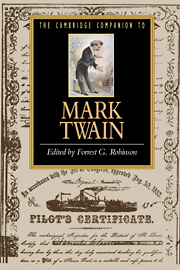Book contents
- Frontmatter
- 1 Mark Twain as an American Icon
- 2 The Innocent at Large
- 3 Mark Twain and Women
- 4 Mark Twain's Civil War
- 5 Banned in Concord
- 6 Black Critics and Mark Twain
- 7 Mr. Clemens and Jim Crow
- 8 Speech Acts and Social Action
- 9 How the Boss Played the Game
- 10 Mark Twain's Travels in the Racial Occult
- 11 Mark Twain's Theology
- Further Reading
- Index
- Continued Series List
11 - Mark Twain's Theology
The Gods of a Brevet Presbyterian
Published online by Cambridge University Press: 28 May 2006
- Frontmatter
- 1 Mark Twain as an American Icon
- 2 The Innocent at Large
- 3 Mark Twain and Women
- 4 Mark Twain's Civil War
- 5 Banned in Concord
- 6 Black Critics and Mark Twain
- 7 Mr. Clemens and Jim Crow
- 8 Speech Acts and Social Action
- 9 How the Boss Played the Game
- 10 Mark Twain's Travels in the Racial Occult
- 11 Mark Twain's Theology
- Further Reading
- Index
- Continued Series List
Summary
Humor, by definition, becomes a polemical factor in the Christian view of life. . . . The Comic is always based on contradiction.
Kierkegaard, Journals and Papers, vol. 2, pp. 264, 266Father Adam 0& the apple - he didn't know it was loaded.
Mark TwainEXPLORING THE JOKE OF JOKES: THE NATURE O F RELIGIOUS BELIEF
“Place yourself at the centre of a man's philosophic vision, ” William James counseled, “and you understand at once all the different things it makes him write or say. But keep outside, use your post-mortem method, try to build the philosophy out of simple phrases, first taking one and then another in seeking to make them fit and of course you fail. You crawl over the thing like a myopic ant over a building, tumbling into every microscopic crack or fissure, finding nothing but inconsistencies, and never suspecting that a centre exists. ” Unfortunately, the critic cannot wholly disregard the “postmortem ” method, and so it is inevitable that “inconsistencies ” - even radical contradictions - will frustrate any attempt to find that satisfying artistic wholeness or philosophical unity we seek - or sometimes never suspect exists - in a writer of Mark Twain's complexity and stature. This does not mean that the critical struggle to place ourselves at the “centre ” can be dispensed with; rather, we must pursue the task in the expectation that any judgment we make of what that “centre ” finally is will at least yield us a measure of consistency in all the inconsistencies we are bound to discover.
- Type
- Chapter
- Information
- The Cambridge Companion to Mark Twain , pp. 220 - 248Publisher: Cambridge University PressPrint publication year: 1995
- 5
- Cited by

